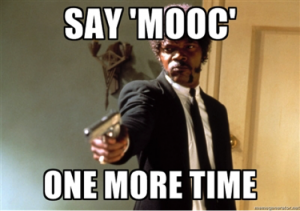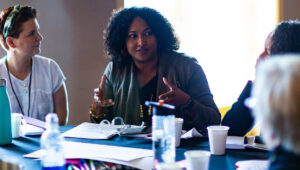In late April, NAS attended the Open Education Global Conference 2015 in Banff, Canada. We were fully prepared to “wonk” out – and weren’t disappointed. If you’re wondering “what is open education?” – you’re not alone! The Open Education Consortium (a conference organizer) offers a definition:
Open education encompasses resources, tools and practices that employ a framework of open sharing to improve educational access and effectiveness worldwide.
Put another way, open education is the application of open source principles that may be more familiar to you from the software and technology worlds.
We travelled to Banff seeking to learn more about the newest thinking in pedagogy and technology driving online learning. We did, but were also quickly initiated into a new world of “open:” open education (OE), OE resources (OER), “Z degrees” (zero textbooks), the role of Creative Commons, building sustainable open business models and critically, the difference between “open” and “free.”
The conference drew a primarily academic audience, and an astonishingly diverse one, from global south and north. Particularly interesting were sessions on licensing/sublicensing MOOC (Massively Open Online Courses) content, frameworks for analyzing how organizations add value in creating MOOCs within the open context and new research findings on how to boost engagement in this new medium – a perennial challenge if you’ve taken or taught a MOOC.
We were fascinated at the similarities and contrasts between our work as a mission-based organization and the “open” ethos. At first, they seem highly aligned in sharing a goal of reducing barriers to access. When one begins to peel layers away, one sees the difference: free (or nearly free) isn’t the same as open. Early in the conference, after learning about our online library of video and other leadership tools, a new colleague assumed we made these available under a Creative Commons license. We realized they were not – and had the first personal inkling of the space between free and open.
As mission-based institutions, almost every arts and culture organization strives to make at least some of their programming, outreach and educational offerings available in a way that minimizes or removes price as a barrier. Many also work to remove cultural and geographic barriers. In Banff, we learned about the more expansive conception that is “open:” a desire to remove cost entirely; to reduce or eliminate corporate, private and governmental control of key resources (internet, intellectual property, technology protocols); to make intellectual property freely available for others to build on and recombine with other work. There is no single definition of open education. It is a “big tent.” We listened, met and talked with educators, technologists, a revolutionary or two, entrepreneurs, orthodox NGO leaders from wealthy nations, anarchists and academics. Unsurprisingly, there are divergent thoughts on how much purity is required to be truly open.
All organizations require resources, an economic logic that allows them to create value. There were rich and spirited conversations about what building a sustainable model in an open context means – for an organization and for the field. We left Banff with heads full after a very thought-provoking three days, considering what place “open” may have in our work and for the arts and culture field. How might we navigate the whitewater between open principles and our field’s values and practice? There is tension between our field’s embrace of inclusion and access and way of working that is often highly proprietary for creative and economic reasons. Could our online education programming be both free and open? If so, how open? What effect might this have on partnerships – and our economic logic? Stay tuned!
How do you define open? What might a more open version of your organization look like? Are you already there?
OE Global 2015 presentations (links to conference presentations, papers)
The next OE Global will be held in Kracow, Poland, from April 13-15, 2016.



